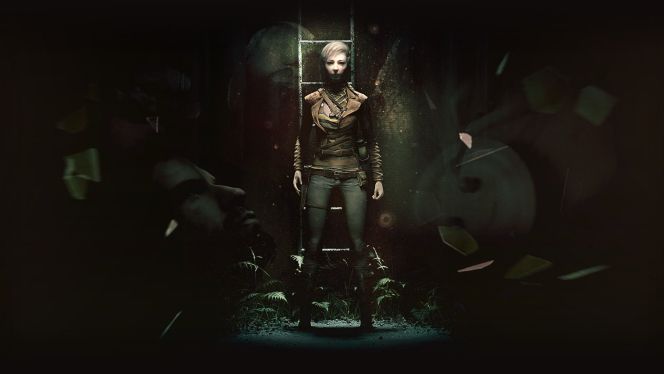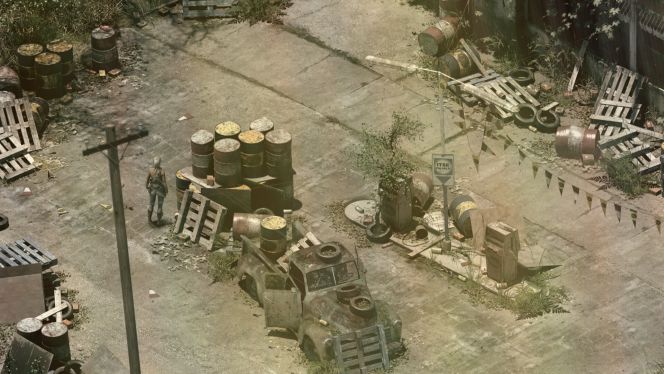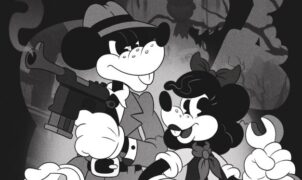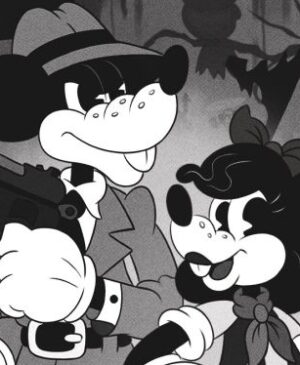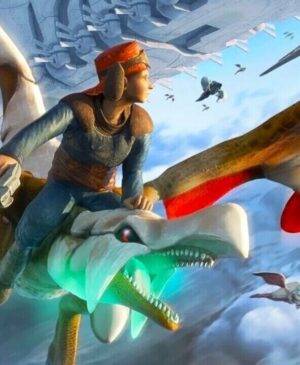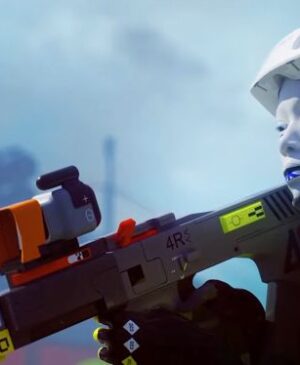REVIEW – Perkele is a strong word in Finnish (the Swedish equivalent is helvete), roughly equivalent to the English word hell. We’ll probably say it a few times in this post-apocalyptic point-and-click game that doesn’t even pretend to be from a Finnish developer, as Act Normal Games has given the game an admittedly northern Finnish setting (and a Finnish accent!).
It’s no coincidence that the game feels old-fashioned, as it takes place almost half a century ago, and somehow the apocalyptic events didn’t have as much impact on the Nordic region as they did on many other parts of the world.
1975, in the midst of a catastrophe
Rauniot begins shortly after a natural disaster has turned civilization upside down. Riots, conflicts, and wars have broken out across the globe, several continents have been flooded, and massive amounts of pollution from collapsed nuclear power plants and rockets have been released onto the planet. Mutant children are sending their mothers to the afterlife, fathers are becoming cannibalistic due to lack of resources, and the balance has been broken. Some are still relying on others to band together to provide shelter, food, electricity, and clean water for the survivors. One of them is Aino, our protagonist, who will travel to more than seventy such places and solve no small number of puzzles. The positive aspect of the game lies mainly in its melancholic and desperate atmosphere, which is understandable in a way: for the Finns, who are usually calm and seem to not give a damn in general, sisu (which is practically perseverance in English…) is not enough in this environment, and so they resign themselves to the fact that nothing will ever be the same again. Aino also takes notes in her notebook (which is good because she writes down every single element of the adventure), but she has to get used to the changes.
And the player has to get used to the fact that Rauniot is damn slow. Aino is trying to find a member of her community or some kind of experimental nuclear train. Our character is well prepared, so she doesn’t go barefoot, but has special equipment and may look a bit scary, but you get used to the fact that she is not a typical character, which makes her unique. The story is not very deep and the characters are not very talkative (although this is normal for Finns). The gameplay is not simplified. There is no highlight button, so you have to be prepared for the classic pixel chase, and the need to move between locations often makes the already problematic pacing even worse and has a negative effect on the immersion in the game. Rauniot often went off on his own, which was a lifesaver, because in some places you can die from experimenting, and the result is a somewhat rough scene. It can sometimes be a bit strange how Act Normal Games switches from isometric view to scene, but at least it switches here and there, so it’s not too bad.
Prone to monotony
Why is this? It’s not because of the dubbing (and you can’t switch to English because there’s no English option), it’s because of the way the language is given that it feels rather monotonous. The subtitles, on the other hand, are not flawed and are easy to understand. The graphics are old-fashioned, but maybe that suits the game since it is still set in the seventies. The soundtrack has a style that fits the atmosphere. At the beginning it was a bit more rocking, but then it basically just goes down to a kind of background noise. So the overall feel is quite dated and offers something that sounds like something that was released in the late 1990s, maybe early 2000s.
Maybe that’s why it can be divisive, because some people won’t like how slow it is, while others will find it varied. Still, you can get to the end of Rauniot quite quickly, because even if you get stuck here and there, it doesn’t take much more than three hours, and you can certainly speed it up. At this point, we need to go into a little more detail about the performance of the Steam Decks, as this is a PC game. Anyone who wants to play on Valve’s handheld PC, DO NOT DO IT. I say this in big letters. The controls are clumsy, and despite the “touchpad” it doesn’t work well. The font size of the text is not adapted to this platform, so it is completely unreadable. The developers didn’t even bother with compatibility (which, by the way, doesn’t affect the rating). It might be better on another platform (e.g. Asus ROG Ally), but don’t push it, it’s not even suitable for that genre.
In ruins? In traces…
The word rauniot means ruin in Finnish, which is appropriate for the post-apocalyptic setting. Rauniot is partially ruined. The rating can be quite extreme: if you don’t like it, you’ll probably give it a 3/10, if you like it, you’ll give it an 8/10. Let’s have a middle ground – it’s a 6/10 game because it’s not a very long experience and it’s a bit slow. It follows the style of the Finns, but south of them it won’t be so remarkable. The game is interesting, but you can’t take that away from it: the setting itself makes it unique, as not many games take us to the north of Finland!
-V-
Pros:
+ Northern Finland
+ Unique melancholic mood
+ Point-and-click
Conts:
– This is precisely the problem, that point-and-click: it can be prone to pixel hunting
– Maybe it has a bit of a slow pace/strong>
– Short and unplayable on Steam Deck
Publisher: Act Normal Games
Developer: Act Normal Games
Style: point-and-click
Release: April 17, 2024.
Rauniot
Gameplay - 5.7
Graphics - 5.8
Story - 6.2
Music/Audio - 5.8
Hangulat - 7
6.1
FAIR
REVIEW - Perkele is a strong word in Finnish (the Swedish equivalent is helvete), roughly equivalent to the English word hell. We'll probably say it a few times in this post-apocalyptic point-and-click game that doesn't even pretend to be from a Finnish developer, as Act Normal Games has given the game an admittedly northern Finnish setting (and a Finnish accent!).

